Sputnik V: It's what Klaus Schwab craves!
The bigshots behind Russia's vaccine have deep ties to the World Economic Forum
There appears to be growing consensus that Klaus Schwab’s World Economic Forum may not be a force for good. In fact, mounting evidence suggests Schwab and his protégées are responsible for a great deal of misery and general mischief all over the world.
Much has been written about the so-called Great Reset and the Fourth Industrial Revolution—and how these utopian visions are related to the worldwide rollout of COVID vaccines and other “public health” measures. With very few exceptions, Russia and its “flagship” vaccine, Sputnik V, are never mentioned when these topics are discussed.
This is surprising because of all the vaccines on the market, Sputnik V arguably has the most obvious direct ties to the WEF and its mission.
Let’s briefly survey the key players behind Russia’s much-celebrated jab and see if we can find a common theme.
Herman Gref (Hermann Gräf), CEO, Sberbank
Herman Gref (or if you prefer to address him in his native German, Hermann Gräf) is the CEO of Sberbank, Russia’s largest lender. Majority owned by the Russian government, the bank rebranded as “Sber” in September 2020 and now offers a “universe of services” including facial recognition and “temperature check” systems that are being installed in Russian schools.
Sberbank has been a strategic partner of the World Economic Forum since 2008. In 2009, Gref became a member of the WEF International Business Council. Two years later he was elected to the WEF Board of Trustees.
Sberbank played a key role in the genesis of Sputnik V, which was developed and registered in a record-breaking six months. According to Gref, his company was “included in the work on the creation of a vaccine”—what later became Russia’s flagship COVID shot—and helped “to ensure the transfer of technology to production sites.”
A Sberbank subsidiary, created in May 2020, was given sole control over delivering Sputnik V batches to Russia’s regions. The company shipped the first 9 million doses of the vaccine before transferring supply and delivery logistics to state conglomerate Rostec in March of this year.
Gref himself was one of the first people in the world to be injected with the vaccine. The head of Russia’s largest bank claims he got the shot sometime in April 2020—meaning he was likely part of controversial “informal trials” in which Gamaleya Center scientists injected themselves and family members with the experimental drug. “Formal” Phase I testing began two months later, on June 18.
From developing QR code-based payment systems to pushing the climate change agenda, Gref is arguably Schwab’s most fervent follower in Russia. His close involvement with Sputnik V’s development and rollout is, of course, purely coincidental.
You can learn more about his Great Reset escapades here:
Kirill Dmitriev, CEO, Russian Direct Investment Fund
Kirill Dmitriev heads the Russian Direct Investment Fund. Created in 2011, RDIF is a government-operated investment fund that acts as “a catalyst for direct investment in Russia.” Dmitriev’s fund is the main financer behind Sputnik V, and was tasked by the Russian government to “organize the production” of the vaccine and “promote it in foreign markets.”
As it just so happens, Dmitriev is a World Economic Forum all-star: the Harvard-educated ex-Goldman Sachs banker was designated a WEF “Young Global Leader” in 2009.
For the English-speaking world, Dmitriev has become the face of Sputnik V: he has made numerous appearances on American news networks where he hypes up Russia’s vaccine. He is also famous for writing op-eds plastered with very blatant and easily refuted lies.
Dmitriev isn’t just a cheerleader for Sputnik V: he is also a big proponent of Big Pharma shots and advocates for combining Russia’s vaccine with Pfizer and Moderna doses.
For example, in August, Argentina began administering AstraZeneca and Moderna shots to people who had received the first Sputnik V dose. The Argentinian government said it was mixing the drugs due to supply shortages, but Dmitriev insisted this had been the plan all along.
“We suggested it, we always wanted to do a combo,” the RDIF CEO said at the time. “Sputnik is the first combined vaccine, the first mix and match, which consists of two different shots. We have said from the beginning that two different shots work better than two identical ones.”
Even before the birth of Sputnik V, Dmitriev was something of a Western darling. In January 2019, he argued during an appearance on CNBC that Washington’s sanctions against Moscow were “hurting the liberal agenda” in Russia and “making more conservative people in Russia stronger”—which he apparently disapproved of.
Mikhail Mishustin, Prime Minister, Russian Federation
Russian Prime Minister Mikhail Mishustin reportedly issued a “secret order” in December 2020 which designated a subsidiary of Herman Gref’s Sberbank as the sole supplier of Sputnik V to Russia’s regions.
Mishustin appears to be an unapologetic supporter of the World Economic Forum’s vision for the world. In October, he gave the greenlight to create a Center for the Fourth Industrial Revolution in Moscow.
Actually, Russia’s prime minister believes that the mass adoption of AI, robotics and transhumanist technologies will occur rapidly, and is already talking about the dawn of the fifth industrial revolution.
In July 2020 Mishustin participated in the World Economic Forum’s Cyber Polygon event (co-hosted by Sberbank), which explored issues related to the digitalization of the world economy.
Harmless economy-related brainstorming? Maybe. As you might recall, Schwab has repeatedly warned that COVID-19 will be followed by a “cyber pandemic” that will make the current pandemic look as harmless as a large number of positive PCR tests… wait…
Vladimir Putin, President, Russian Federation
Vladimir Putin and Klaus Schwab go way back.
In January of this year, Putin gave a keynote (virtual) address before the World Economic Forum. The theme of the January 2021 forum: “The Great Reset.”
Beginning his speech with a warm “dear Klaus,” Putin recalled how he first met Mr. Schwab in 1992 and since then had regularly attended events organized by the Fourth Industrial Revolution visionary.
Putin used his address to urge for “expanding the scale of [COVID] testing and vaccinations” across the globe—policies that have ushered in worldwide medical apartheid.
Echoing the sentiments of western leaders, Putin also argued that the global economy would need to be rebuilt from the ground up by central banks:
[T]he key question today is how to build a program of actions in order to not only quickly restore the global and national economies affected by the pandemic, but to ensure that this recovery is sustainable in the long run, relies on a high-quality structure and helps overcome the burden of social imbalances. Clearly, with the above restrictions and macroeconomic policy in mind, economic growth will largely rely on fiscal incentives with state budgets and central banks playing the key role.
The Russian president has repeatedly stated vaccination should be voluntary—but his personal opinion has had no impact on actual policy. All 85 regions of Russia now have decrees requiring certain segments of the population to get the shot.
On December 17, Putin voiced support for a nationwide QR code law—one of the most unpopular pieces of legislation in recent Russian history. The introduction of digital health IDs would in essence make vaccination compulsory for those who want to partake in life’s most ordinary activities.
In late November, after the health ministry approved “Sputnik-M”—Russia’s COVID shot for ages 12-17—Putin suggested authorities begin “thinking about” vaccinating children starting from the age of two. How many two-year-olds have died from COVID in Russia? (Trick question: the Russian government doesn’t disclose COVID-linked deaths by age group. In fact, the Russian government refuses to publish lots of highly important COVID-related data, including statistics on post-vaccination side effects. Why?)
Maybe time for a rethink?
In October, RT.com ran a provocative op-ed describing the Great Reset as a “cartoonish fantasy that will hand the global elite even more power.”
The piece lists various world leaders—including Boris Johnson, Emmanuel Macron, and Angela Merkel—as devout followers of Schwab. No mention of Russia anywhere.
The irony, of course, is that Sputnik V is practically the official vaccine of the WEF—and the Russian government is among Schwab’s biggest fans.

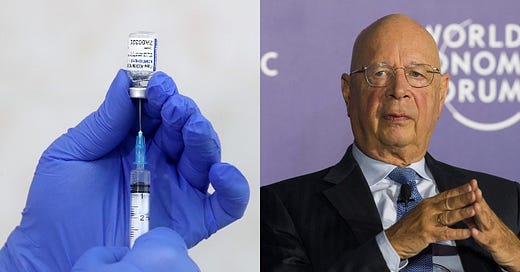



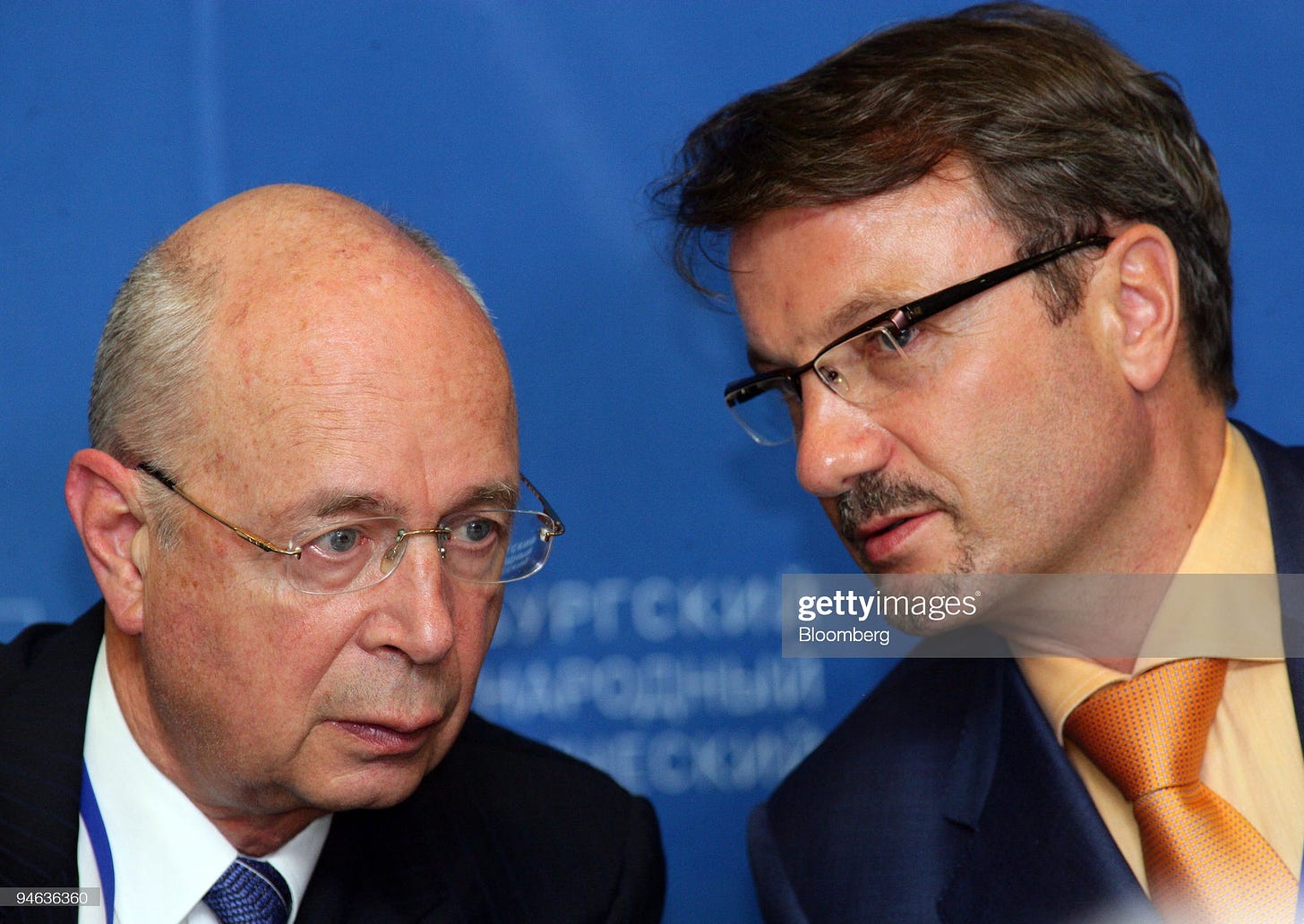



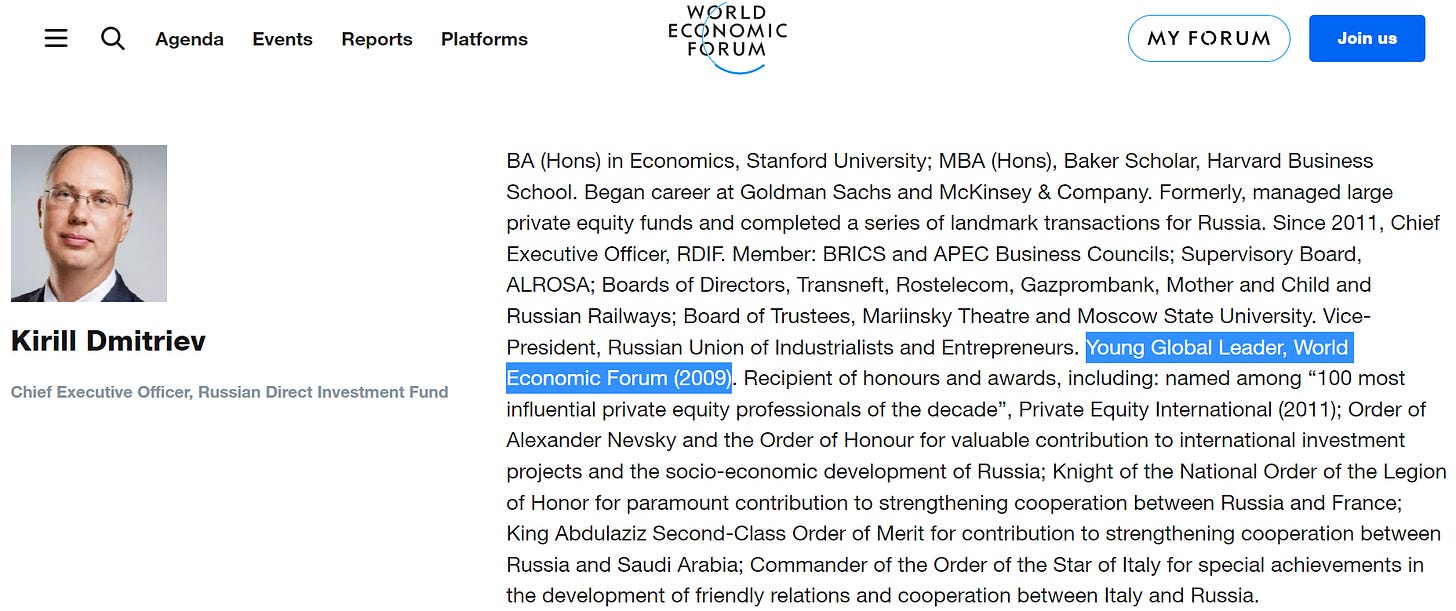

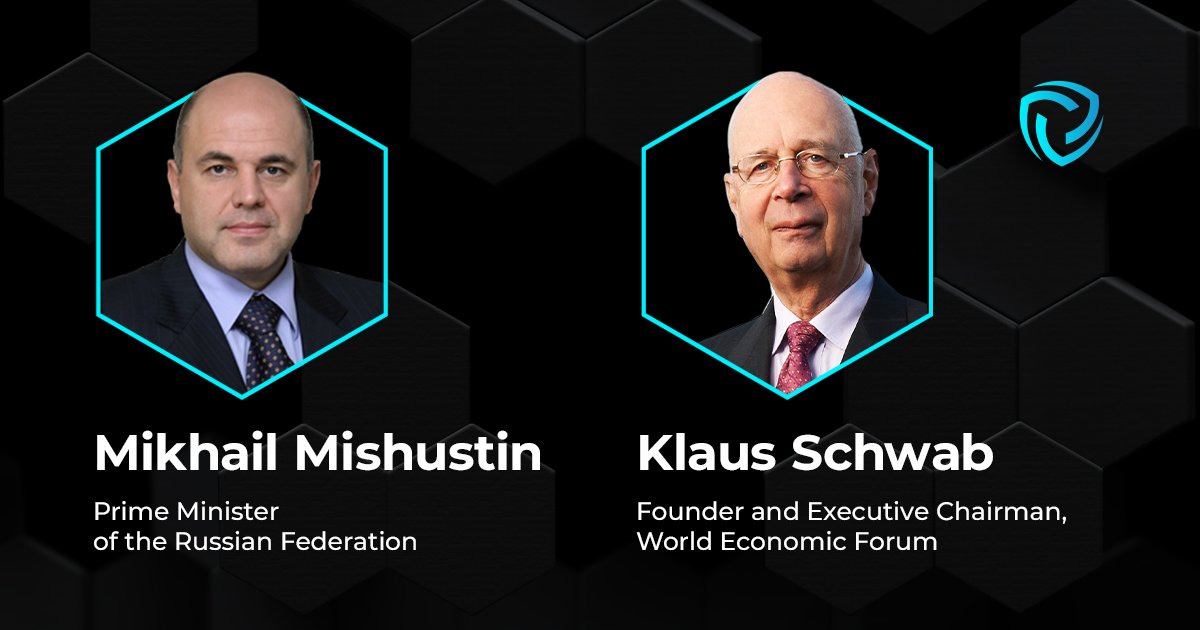
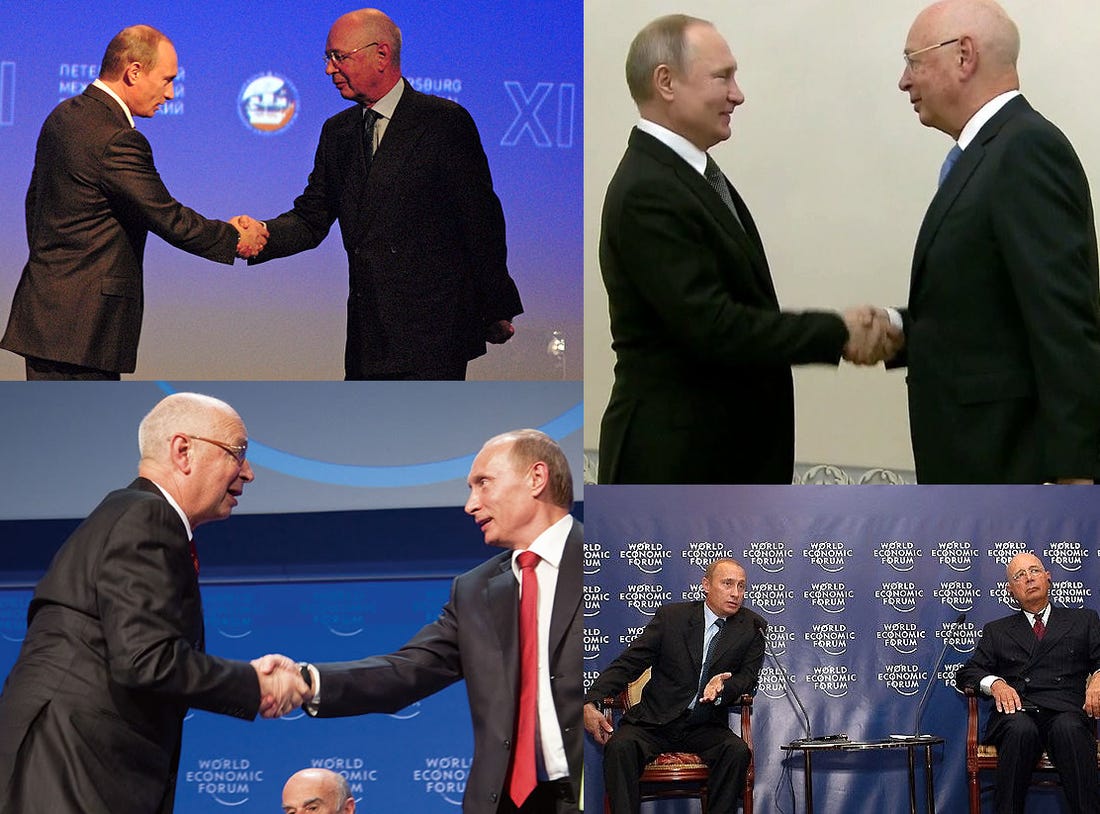

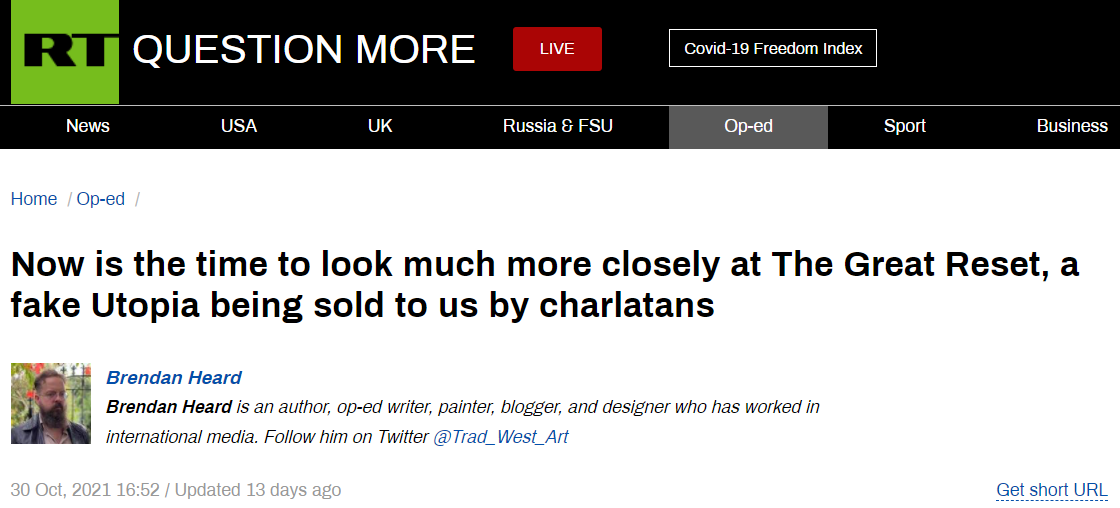
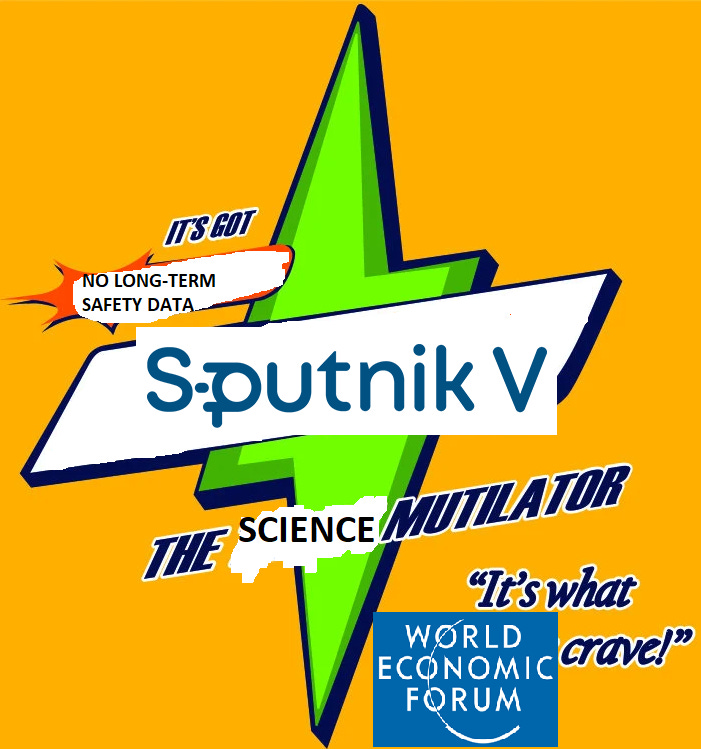

Russian elites had a dream to converge, or perhaps even better term would be to "join in ecstasy" with the Western elites since the passing of Leonid Brezhnev in 1982, when Yuriy Andropov came to power for a short period of time before he passed away too. But the process didn't stop with Andropov's passing. Deep in the bowels of the Soviet power structures people like Gorbachev, Shevardnadze, Yakovlev and countless others were getting ready to step forward and prepping the country for a big sell off that came in 1991, but especially in 1993 after Yeltsin used tanks to supress opposition by Parliament. A known Russian philosopher, playwright and leader of the movement "The Essence of Time" (Суть Времени), Sergey Kurginian, calls this philosophy by Russian elites "vkhozhdenchestvo" (вхожденчество) that could be loosely translated with a made up word "entrantism". But for many reasons that I won't be getting into here, Russian nouveau riche elites were not allowed to become a part either of European old money, old aristocracy, nor they were welcomed by the American elites that formed in the late nineteenth, early twentieth century. The situation got particularly bad after 2014 when for many of them the option to spend half of their time with their families in the West in their magnificent real estate holdings there, while formally working in Russia was blocked. Even more, bad things started to happen to some children of Russian elites, like a totally strange drowning in absolutely calm seas in UAE of a son of then the head of president Putin's administration office, Sergey Ivanov - Aleksandr Ivanov. This was the time of confusion and even despair for many in the power circles in Russia. The whole raison d'etre for the country according to them was to join forces with the West, for elites to become one through intermarriages and joining of capitals, but they were snubbed and given a cold shoulder instead of a kiss. This is when Schwab and his WEF came to prominence. A new way to have a seat at the elite's table was found. Instead of entering the Western world through a front door, they decided to enter the new emerging "Inclusive Capitalism" and "Great Reset" world through the back door. This is the belief of absolute majority among Russian elites now, from people in Moscow to some governor of a remote region of Chukotka, 10 time zones away from Moscow, that being exemplary executioners of the will of the globalist powers in establishing the NWO they'll not only survive, but will get to keep their position of privilege and all the assets they managed to accumulate. The problem now comes down to ordinary Russians' resistance, from majority's refusal to get jabbed to fierce resistance to QR coding and other forms of restrictions. This is why with a new set of recent unconstitutional laws Russian citizens were effectively denied a right to a peaceful protest. Police powers to use violence were greatly increased and the new trend of electronic voting tested in major cities during last Duma elections gives the ruling United Russia party an assurance to never lose majority in Parliament. Russian elites think they're going to win against Russian people. I, personally, am not so sure of that.
Wow. What a surprise. Not!
A more pertinent question is: who does Klaus work for?
Who did Prince Charles refer to when he said "He has access to trillions..."
Who has access to trillions?